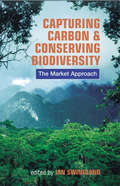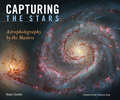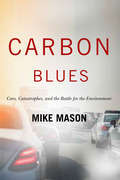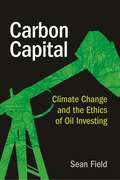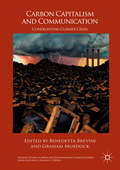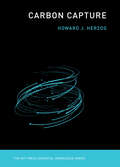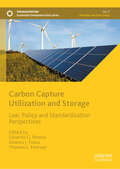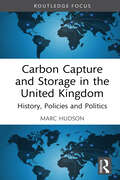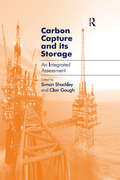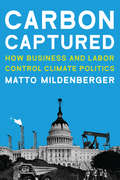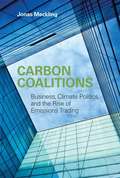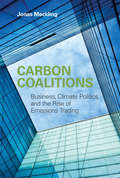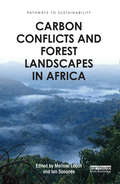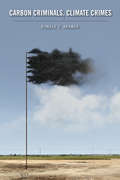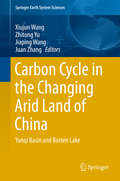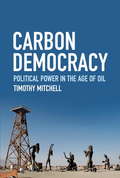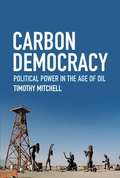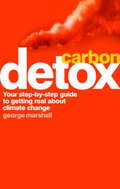- Table View
- List View
Captive Splendors: A Novel (The Captive Series #3)
by Fern MichaelsA manly captain pines for his sexy stowaway in this classic tale of destiny and desire at sea from the #1 New York Times–bestselling author. As a van der Rhys, Caleb&’s first allegiance is to the sea. Close behind are his affections for anyone foolish enough to pass him in a skirt. But that shouldn't be a problem when he&’s hired to ship a cargo of Puritans to the colonies—until a stowaway is discovered onboard. Wren is equal parts stormy and beautiful, normally an irresistible combination for Caleb. But they have a shared past that deems her off limits. All they have are the stars to guide them, in which case anything is possible . . . Third in the series! Praise for the Novels of Fern Michaels &“There's enough melodrama in Michaels's newest offering . . . to quench the thirst of soap opera devotees.&” —Publishers Weekly on About Face &“Michaels knows what readers expect from her and she delivers each and every time.&” —RT Book Reviews on Perfect Match
Capturing Carbon and Conserving Biodiversity: The Market Approach
by Ian R. SwinglandFor decades conservation has been based on the donor-driven principle. It hasn't worked. For centuries, environmental pollution or degradation has been addressed by the same attitude: the 'Polluter Pays' principle. That hasn't worked either. The cycle has to stop. But while everyone talks about using a market-driven approach, few know how to do it. Faced with the situation on the ground what do you do? What is happening? How can you engage a system so that it is self-sustaining and the people self-motivated? This study explores how the growing market in carbon can help to conserve carbon-based life forms. It discusses how reducing global warming and saving biodiversity can both be achieved with the right market conditions. The contributors include conservation biologists, ecologists, biologists, economists, lawyers, community and tribal specialists, financial specialists, market makers, environment specialists, climatologists, resource managers, atmospheric scientists, project developers and corporate fund managers.
Capturing Kahanamoku: How a Surfing Legend and a Scientific Obsession Redefined Race and Culture
by Michael Rossi"A haunting, quietly devastating excavation of a story we should all know but don’t: how a surfing legend became the target of eugenic obsession... Gorgeously written and brilliantly researched, this book is both a warning and a wonder." — Laurie Gwen Shapiro, author of The Aviator and the Showman"[A] strange and captivating account... Rossi excels at exposing the bunk pseudoscience at the heart of eugenicists' mystical fascination with race... readers will find this a fascinating look at the painful intersection of Hawaiian and sports history with an ignominious branch of science." - Publishers WeeklyThe fascinating untold story of one scientist’s pursuit of a legendary surfer in his quest to define human nature, written with the compelling drama and narrative insight of Why Fish Don’t Exist and The Lost City of Z. Deep in the archives of New York’s American Museum of Natural History sits a wardrobe filled with fifty plaster casts of human heads a century old. How they came to be is the story of one of the most consequential, and yet least-known, encounters in the history of science. In 1920, the museum’s director, Henry Fairfield Osborn, traveled to Hawaii on an anthropological research trip. While there, he took a surfing lesson with Duke Kahanamoku, the famous surf-rider and budding movie star. For Osborn, a fervent eugenicist, the tall, muscular Kahanamoku embodied the “pure racial type” he was desperate to understand and, more significantly, preserve, in the human race.Upon his return to New York, Osborn’s fixation grew. He dispatched young scientist Louis Sullivan to Honolulu to measure, photograph, and cast in plaster Kahanamoku and other Hawaiian people. The study touched off a series of events that forever changed how we think about race, culture, science, and the essence of humanity. In Capturing Kahanamoku, historian Michael Rossi draws on archival research and firsthand interviews to weave together a truly fascinating cultural history that is an absorbing account of obsession, a cautionary tale about the subjectivity of science, a warning of the pernicious and lasting impact of eugenics, a meditation on humanity, and the story of a man whose personhood shunned classification.A heady blend of Barbarian Days and The Immortal Life of Henrietta Lacks, Capturing Kahanamoku is a twentieth-century saga with ever-clearer implications for our times.Capturing Kahanamoku includes 16-20 black-and-white photos throughout.
Capturing the Stars: Astrophotography by the Masters
by Robert GendlerPortraits of the deep sky and of local astronomical phenomena taken by the world&’s renowned astrophotographers—with a foreword by Neil deGrasse Tyson. To gaze at the stars is one thing; to capture that gaze in photographs is something else, a tantalizing scientific art that many attempt and few master. That rare mastery is on full display in this beautiful volume of space photography from thirty of the most accomplished astrophotographers in the world, both professional and amateur. Galaxies, star clusters, nebulae, and other deep-sky treasures fill the pages. Along with the marvels of the night sky—the Andromeda and Whirlpool galaxies, the Pleiades and the Praesepe, the Orion and Crab nebulae, and many more—each section features a profile of the photographer&’s work, techniques, philosophy, and experiences. Compiled by the world&’s leading amateur astrophotographer, with an introduction to the history of space photography, this spectacular volume is an essential for every stargazer&’s bookshelf.elf.
Capybara: Biology, Use and Conservation of an Exceptional Neotropical Species
by Emilio A. Herrera David W. Macdonald José Roberto Moreira Katia Maria FerrazThe capybara is the neotropical mammal with the highest potential for production and domestication. Amongst the favorable characteristics for domestication we can list its high prolificacy, rapid growth rate, a herbivorous diet, social behavior and relative tameness. The genus (with only two species) is found from the Panama Canal to the north of Argentina on the east of the Andes. Chile is the only country in South America where the capybara is not found. The species is eaten all over its range, especially by poor, rural and traditional communities engaged in subsistence hunting. On the other hand, in large urban settlements wildlife is consumed by city dwellers as a delicacy. The sustainable management of capybara in the wild has been adopted by some South American countries, while others have encouraged capybara rearing in captivity.
Capybaras (Animals)
by Martha E. RustadCapybaras are the biggest rodents in the world! These social animals live in large groups and spend lots of time in water. Get all the facts on these huge rodents.
Car-Free Los Angeles and Southern California
by Nathan LandauThe time has come for Car-Free Los Angeles and Southern California. The peril of global climate change dominates the headlines. In California almost 40% of greenhouse gases come from transportation. More and more people-especially young people-are realizing the current approach to mobility is not sustainable.Car-Free Los Angeles and Southern California is designed as a complete guide to a car-free vacation in Southern California, from the time travelers land or arrive until the time they leave. Car-Free Los Angeles and Southern California reveals how to get from the airport-or the train station or bus station-into town. For Los Angeles or Southern California residents, this book tells how to plug into the transit network and start traveling car-free to the local attractions.Contrary to old stereotypes, Southern California is a great place to travel car-free. It has a lovely train that travels along the coast. It has a ferry across the water to a town with a limit on the number of cars--Avalon on Catalina Island. There's a beautiful city that gives you discounts for traveling car-free. Los Angeles' buses go to the front door of world class museums, theatres, and shops. Disneyland will shuttle travelers from motels to the park.The book lists good places to stay that are transit accessible. Car-Free Los Angeles and Southern California discloses the terrific things to see and do in Southern California with detailed information on how to get there. Whether it's sightseeing, shopping, eating, visiting museums or something else altogether-Car-Free Los Angeles and Southern California will get you there.
Caravans: Lives on Wheels in Contemporary Europe
by Hege Høyer LeivestadIn Caravans, Hege Høyer Leivestad opens the caravan door to understand how daily life is organised among Britons and Swedes who have relocated, either seasonally or permanently, to mobile homes. Leivestad investigates how the caravan and campsite come to fit and challenge conventional domestic ideals, and how the static mobile caravan can nurture ideas of freedom even when it is standing still. With sensitivity and an awareness of the humour and pathos of the lives of her subjects, Leivestad closely examines the shaping of the European camping phenomenon and its day-to-day pleasures and pains, ranging from friendships ties to conflictive bingo nights, from nosy and noisy neighbours to fake fireplaces and rotten awning floors. As the first ethnographic study of caravan life in Europe, Caravans offers a refreshing take on contemporary mobility debates, showing how movement can best be understood by taking a detailed look at certain specific mundanities in material culture. This rich and topical ethnography is a must-read for students of anthropology, human geography and architecture, and for those with an interest in the possibilities and perils of a life on wheels.
Carbon Blues: Cars Catastrophes and the Battle for the Environment
by Mike MasonClimate change is the most serious crisis of our time. As history is being written in fire in California and Greece, in the warming waters of the Gulf of Mexico, and in the melting ice of the Arctic and Antarctica, Carbon Blues demystifies current debates on climate change, discussing everything from carbon dioxide increases in the atmosphere caused by cars, coal, and oil to global warming and worsening natural disasters. A detailed examination of the history of climate change and its present and future consequences, Carbon Blues traces the essential economic importance of coal in the nineteenth century and oil in the twentieth, emphasizing the role of the automobile and the internal combustion engine in the dereliction of our planet. Exposing campaigns to mislead the public, Mike Mason reveals that the fatal consequences of CO2 and NO2 have been widely known for decades but successfully discounted and manipulated by the carbon lobby led by Exxon, BP, figures such as the Koch brothers, and democratically elected governments. The book underlines the disturbing truth: that despite current attempts to remediate climate change, the harm already done - melting polar ice and the warming and rising of the seas - will be virtually irreversible. As the fight against climate change comes to a head, Carbon Blues searches for fruitful ways forward.
Carbon Blues: Cars Catastrophes and the Battle for the Environment
by Mike MasonClimate change is the most serious crisis of our time. As history is being written in fire in California and Greece, in the warming waters of the Gulf of Mexico, and in the melting ice of the Arctic and Antarctica, Carbon Blues demystifies current debates on climate change, discussing everything from carbon dioxide increases in the atmosphere caused by cars, coal, and oil to global warming and worsening natural disasters. A detailed examination of the history of climate change and its present and future consequences, Carbon Blues traces the essential economic importance of coal in the nineteenth century and oil in the twentieth, emphasizing the role of the automobile and the internal combustion engine in the dereliction of our planet. Exposing campaigns to mislead the public, Mike Mason reveals that the fatal consequences of CO2 and NO2 have been widely known for decades but successfully discounted and manipulated by the carbon lobby led by Exxon, BP, figures such as the Koch brothers, and democratically elected governments. The book underlines the disturbing truth: that despite current attempts to remediate climate change, the harm already done - melting polar ice and the warming and rising of the seas - will be virtually irreversible. As the fight against climate change comes to a head, Carbon Blues searches for fruitful ways forward.
Carbon Capital: Climate Change and the Ethics of Oil Investing
by Sean FieldSurprising insights into the worldviews of oil and gas financiersIt is no secret that the fossil fuel industry, whose products power modern America both physically and financially, inflicts immense destruction to our environment. The past, present, and future of US energy have been determined not just by engineers, but by financiers, an under-studied group of energy investors.Drawing on four years of ethnographic work in Houston, Texas, the financial center of the oil industry, Carbon Capital explores how oil financiers decide what a good investment is, and how they incorporate ethics into their decision making. While many who are concerned about climate change see those involved in the gas and oil industries as immoral profit chasers who do not care about the environment, the author finds that this is not the case. His interviews and observations demonstrate that the people who finance the energy industries are actually deeply concerned with ethics. They grapple with questions about climate change and what it means to do the right thing, but the choices they make are ultimately guided by a combination of how they perceive the historical context in which they operate, their faith, which is largely religious Christian; their financial interests; plus the capitalist system in which they are running, all of which come together to shape their moral understandings about what a good energy future looks like. While the worldview of oil financiers may not align with our own, the author argues that given their importance in shaping environmental approaches, it is crucial that we understand what drives their ethical sensibilities.
Carbon Capitalism and Communication: Confronting Climate Crisis (Palgrave Studies In Media And Environmental Communication)
by Graham Murdock Benedetta BreviniThis volume examines the role of communication in contributing to and contesting the current climate crisis. There is now widespread agreement that even if increases in carbon emissions are kept to the current international target the climate crisis will continue to intensify. This book brings together, for the first time, state-of-the-art research with activists' interventions to place debate around climate crisis within the wider conversation about the changing relations between communications and contemporary capitalism. Contributors include; Naomi Klein, Michael Mann, Alan Rusbridger, Vincent Mosco, Jodi Dean, and leading figures in Greenpeace and 350. org.
Carbon Capture (The MIT Press Essential Knowledge series)
by Howard J. HerzogA concise overview of carbon dioxide capture and storage (CCS), a promising but overlooked climate change mitigation pathway.The burning of fossil fuels releases carbon dioxide (CO2), and these CO2 emissions are a major driver of climate change. Carbon capture offers a path to climate change mitigation that has received relatively little attention. In this volume in the MIT Press Essential Knowledge series, Howard Herzog offers a concise guide to carbon capture, covering basic information as well as the larger context of climate technology and policy. Carbon capture, or carbon dioxide capture and storage (CCS), refers to a suite of technologies that reduce CO2 emissions by “capturing” CO2 before it is released into the atmosphere and then transporting it to where it will be stored or used. It is the only climate change mitigation technique that deals directly with fossil fuels rather than providing alternatives to them. Herzog, a pioneer in carbon capture research, begins by discussing the fundamentals of climate change and how carbon capture can be one of the solutions. He explains capture and storage technologies, including chemical scrubbing and the injection of CO2 deep underground. He reports on current efforts to deploy CCS at factories and power plants and attempts to capture CO2 from the air itself. Finally, he explores the policies and politics in play around CCS and argues for elevating carbon capture in the policy agenda.
Carbon Capture Utilization and Storage: Law, Policy and Standardization Perspectives (Sustainable Development Goals Series)
by Eduardo G. Pereira Alberto J. Fossa Thomas L. MuinzerThis book delves into how carbon capture, utilization, and storage (CCUS) technologies might help accelerate the worldwide transition to sustainable energy while meeting Paris Agreement targets. This comprehensive handbook examines how governments, businesses, and society may effectively implement CCUS programs to cut carbon emissions and promote economic development. The book begins with basic ideas and exposes readers to CCUS technologies and their critical role in reaching net-zero emissions by 2050. It investigates successful CCUS installations from various countries and suggests prospects for host governments and energy firms. The book combines technical innovation and carbon neutrality initiatives, while also addressing regulatory frameworks and normative factors that are critical for wider acceptance. With climate change mitigation at its core, the book offers pragmatic recommendations for policymakers and industry leaders on how to employ CCUS for sustainable development, making it a valuable resource for environmental researchers, energy professionals, and policymakers working toward a low-carbon economy.
Carbon Capture and Storage in the United Kingdom: History, Policies and Politics (Routledge Focus on Energy Studies)
by Marc HudsonThis book is a concise but comprehensive guide to the history, present and possible futures of carbon capture and storage policy and action in the United Kingdom (UK).There have been multiple failed starts, promises and “last chances” for carbon capture and storage (CCS) in Europe, North America, China and Australia, but thus far it has repeatedly collided with the political and economic realities that the technology is too expensive and complicated to gain and keep policymakers’ support. However, in the UK that might be changing, with explicit government support for CCS to help decarbonise industry. Set within the broader context of global interest in CCS, this book first outlines the technologies involved in the types of capture technology, transport options and storage options in the UK. It then briefly introduces an overarching policy analysis framework (John Kingdon’s multiple streams approach) and uses it to give an account of the long history of CCS interest and efforts in three chapters covering the 1970s to 2002, 2003 to 2015 and 2016 to the present day. Marc Hudson focusses on the various arguments made for the introduction of CCS, and the slowly shifting coalitions of actors who make those arguments, while contrasting these with the perspectives of those opposed to CCS.This book will be of great interest to students, scholars and policymakers researching and working in the field, as well as the related areas of energy policy, energy transitions and climate change.
Carbon Capture and its Storage: An Integrated Assessment
by Clair GoughClimate change is arguably the most important environmental issue that the world currently faces. Carbon Capture and Storage (CCS) offers the possibility of significant reductions in the volume of CO2 released into the atmosphere in the near to medium term. As a fairly new technology that has not been widely adopted, there remain some uncertainties related to both viability and desirability. This book discusses the key issues with regard to technical and legal feasibility, economic viability and public and stakeholder perceptions. It also provides recommendations for policy and future research.
Carbon Captured: How Business and Labor Control Climate Politics (American and Comparative Environmental Policy)
by Matto MildenbergerA comparative examination of domestic climate politics that offers a theory for cross-national differences in domestic climate policymaking.Climate change threatens the planet, and yet policy responses have varied widely across nations. Some countries have undertaken ambitious programs to stave off climate disaster, others have done little, and still others have passed policies that were later rolled back. In this book, Matto Mildenberger opens the “black box” of domestic climate politics, examining policy making trajectories in several countries and offering a theoretical explanation for national differences in the climate policy process.Mildenberger introduces the concept of double representation—when carbon polluters enjoy political representation on both the left (through industrial unions fearful of job loss) and the right (through industrial business associations fighting policy costs)—and argues that different climate policy approaches can be explained by the interaction of climate policy preferences and domestic institutions. He illustrates his theory with detailed histories of climate politics in Norway, the United States, and Australia, along with briefer discussions of policies in in Germany, Japan, the United Kingdom, and Canada. He shows that Norway systematically shielded politically connected industrial polluters from costs beginning with its pioneering carbon tax; the United States, after the failure of carbon reduction legislation, finally acted on climate reform through a series of Obama administration executive actions; and Australia's Labor and Green parties enacted an emissions trading scheme, which was subsequently repealed by a conservative Liberal party government. Ultimately, Mildenberger argues for the importance of political considerations in understanding the climate policymaking process and discusses possible future policy directions.
Carbon Coalitions
by Jonas MecklingOver the past decade, carbon trading has emerged as the industrialized world's primary policy response to global climate change despite considerable controversy. With carbon markets worth $144 billion in 2009, carbon trading represents the largest manifestation of the trend toward market-based environmental governance. In Carbon Coalitions, Jonas Meckling presents the first comprehensive study on the rise of carbon trading and the role business played in making this policy instrument a central pillar of global climate governance. Meckling explains how a transnational coalition of firms and a few market-oriented environmental groups actively promoted international emissions trading as a compromise policy solution in a situation of political stalemate. The coalition sidelined not only environmental groups that favored taxation and command-and-control regulation but also business interests that rejected any emissions controls. Considering the sources of business influence, Meckling emphasizes the importance of political opportunities (policy crises and norms), coalition resources (funding and legitimacy,) and political strategy (mobilizing state allies and multilevel advocacy). Meckling presents three case studies that represent milestones in the rise of carbon trading: the internationalization of emissions trading in the Kyoto Protocol (1989--2000); the creation of the EU Emissions Trading System (1998--2008); and the reemergence of emissions trading on the U. S. policy agenda (2001--2009). These cases and the theoretical framework that Meckling develops for understanding the influence of transnational business coalitions offer critical insights into the role of business in the emergence of market-based global environmental governance.
Carbon Coalitions: Business, Climate Politics, and the Rise of Emissions Trading
by Jonas MecklingAn examination of how a transnational coalition of firms and NGOs influenced the emergence of emissions trading as a central component of global climate governance.Over the past decade, carbon trading has emerged as the industrialized world's primary policy response to global climate change despite considerable controversy. With carbon markets worth $144 billion in 2009, carbon trading represents the largest manifestation of the trend toward market-based environmental governance. In Carbon Coalitions, Jonas Meckling presents the first comprehensive study on the rise of carbon trading and the role business played in making this policy instrument a central pillar of global climate governance.Meckling explains how a transnational coalition of firms and a few market-oriented environmental groups actively promoted international emissions trading as a compromise policy solution in a situation of political stalemate. The coalition sidelined not only environmental groups that favored taxation and command-and-control regulation but also business interests that rejected any emissions controls. Considering the sources of business influence, Meckling emphasizes the importance of political opportunities (policy crises and norms), coalition resources (funding and legitimacy,) and political strategy (mobilizing state allies and multilevel advocacy).Meckling presents three case studies that represent milestones in the rise of carbon trading: the internationalization of emissions trading in the Kyoto Protocol (1989–2000); the creation of the EU Emissions Trading System (1998–2008); and the reemergence of emissions trading on the U.S. policy agenda (2001–2009). These cases and the theoretical framework that Meckling develops for understanding the influence of transnational business coalitions offer critical insights into the role of business in the emergence of market-based global environmental governance.
Carbon Conflicts and Forest Landscapes in Africa (Pathways to Sustainability)
by Ian Scoones Melissa LeachAmidst the pressing challenges of global climate change, the last decade has seen a wave of forest carbon projects across the world, designed to conserve and enhance forest carbon stocks in order to reduce carbon emissions from deforestation and offset emissions elsewhere. Exploring a set of new empirical case studies, Carbon Conflicts and Forest Landscapes in Africa examines how these projects are unfolding, their effects, and who is gaining and losing. Situating forest carbon approaches as part of more general moves to address environmental problems by attaching market values to nature and ecosystems, it examines how new projects interact with forest landscapes and their longer histories of intervention. The book asks: what difference does carbon make? What political and ecological dynamics are unleashed by these new commodified, marketized approaches, and how are local forest users experiencing and responding to them? The book’s case studies cover a wide range of African ecologies, project types and national political-economic contexts. By examining these cases in a comparative framework and within an understanding of the national, regional and global institutional arrangements shaping forest carbon commoditisation, the book provides a rich and compelling account of how and why carbon conflicts are emerging, and how they might be avoided in future. This book will be of interest to students of development studies, environmental sciences, geography, economics, development studies and anthropology, as well as practitioners and policy makers.
Carbon Criminals, Climate Crimes (Critical Issues in Crime and Society)
by Ronald C. KramerCarbon Criminals, Climate Crimes analyzes the looming threats posed by climate change from a criminological perspective. It advances the field of green criminology through a examination of the criminal nature of catastrophic environmental harms resulting from the release of greenhouse gases. The book describes and explains what corporations in the fossil fuel industry, the U.S. government, and the international political community did, or failed to do, in relation to global warming. Carbon Criminals, Climate Crimes integrates research and theory from a wide variety of disciplines, to analyze four specific state-corporate climate crimes: continued extraction of fossil fuels and rising carbon emissions; political omission (failure) related to the mitigation of these emissions; socially organized climate change denial; and climate crimes of empire, which include militaristic forms of adaptation to climate disruption. The final chapter reviews policies that could mitigate greenhouse gas emissions, adapt to a warming world, and achieve climate justice.
Carbon Cycle in the Changing Arid Land of China: Yanqi Basin And Bosten Lake (Springer Earth System Sciences Ser.)
by Xiujun Wang Zhitong Yu Jiaping Wang Juan ZhangThis book integrates the analyses of organic carbon and carbonate accumulation in soil and lake sediment in a typical arid region of China that has experienced significant climate and land-use changes.It demonstrates that carbonate accumulation greatly exceeds organic carbon in both soil and sediment. It also shows that intensive cropping with sound land management in the arid land not only increases soil organic carbon stock, but also enhances accumulation of soil carbonate, particularly in subsoils. Carbon accumulation in the lake sediment increased between 1950 and 2000, after which it declined, and the authors explore how human activity and climate change may have caused the changes in carbon burial in the lake sediment.This book is of interest to researchers in a number of fields such as soil science, limnology and global change, as well as to the policy-makers.
Carbon Democracy
by Timothy MitchellOil is a curse, it is often said, that condemns the countries producing it to an existence defined by war, corruption and enormous inequality. Carbon Democracy tells a more complex story, arguing that no nation escapes the political consequences of our collective dependence on oil. It shapes the body politic both in regions such as the Middle East, which rely upon revenues from oil production, and in the places that have the greatest demand for energy.Timothy Mitchell begins with the history of coal power to tell a radical new story about the rise of democracy. Coal was a source of energy so open to disruption that oligarchies in the West became vulnerable for the first time to mass demands for democracy. In the mid-twentieth century, however, the development of cheap and abundant energy from oil, most notably from the Middle East, offered a means to reduce this vulnerability to democratic pressures. The abundance of oil made it possible for the first time in history to reorganize political life around the management of something now called "the economy" and the promise of its infinite growth. The politics of the West became dependent on an undemocratic Middle East.In the twenty-first century, the oil-based forms of modern democratic politics have become unsustainable. Foreign intervention and military rule are faltering in the Middle East, while governments everywhere appear incapable of addressing the crises that threaten to end the age of carbon democracy--the disappearance of cheap energy and the carbon-fuelled collapse of the ecological order.In making the production of energy the central force shaping the democratic age, Carbon Democracy rethinks the history of energy, the politics of nature, the theory of democracy, and the place of the Middle East in our common world.
Carbon Democracy: Political Power in the Age of Oil
by Timothy MitchellOil is a curse, it is often said, that condemns the countries producing it to an existence defined by war, corruption and enormous inequality. Carbon Democracy tells a more complex story, arguing that no nation escapes the political consequences of our collective dependence on oil. It shapes the body politic both in regions such as the Middle East, which rely upon revenues from oil production, and in the places that have the greatest demand for energy.
Carbon Detox: Your step-by-step guide to getting real about climate change
by George MarshallReduce your carbon footprint from day 1 - "Carbon Detox" explains the changes each of us can make at home, at work and in every aspect of our lives. From summer heat waves to rising sea levels, climate change affects us all. The main cause is carbon dioxide and our carbon emissions are growing year by year at a frightening rate. However, there is hope. The changes we make now can slow the effects of climate change and preserve the planet for future generations. George Marshall shows you how to carbon audit your life and start reducing your impact today. He also explains how to overcome psychological blocks such as scepticism, fear and feelings of insignificance. This book includes advice on low carbon transport options and holidays and how to create an energy-efficient home. With the help of "Carbon Detox" you will be able to make real differences from day 1.The author's charity will provide extensive cross-promotional support including talks and workshop events. This is the first book to show how the ordinary 'non-greenie' can make realistic and meaningful changes. It is written by an expert author who lives in a low carbon home. It features carbon calculators for the home, transport and food.

